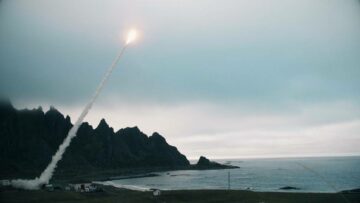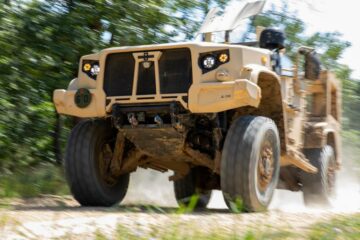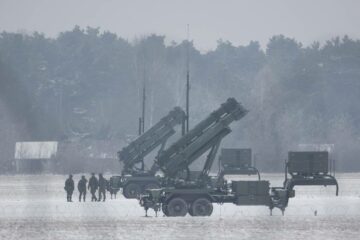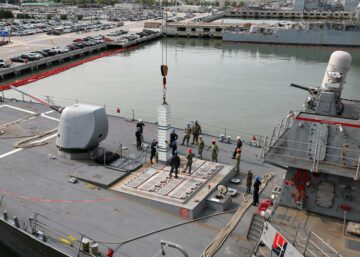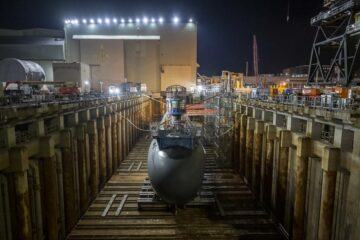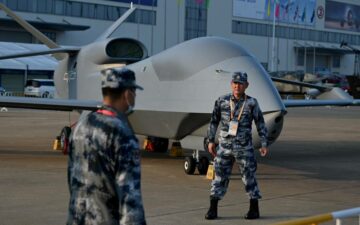
Australia’s national interest lies in a region that is open, stable, peaceful and prosperous. At the ASEAN Defence Ministers’ Meeting Plus in mid-November and at meetings throughout the Pacific, I’ve been clear that Australia is committed to working with our partners to build and defend a region that is peaceful, places the Association of Southeast Asian Nations at its core, respects sovereignty, and operates by agreed rules.
The Australian government is working with its partners to bring about a strategic environment that is characterized by a regional balance, where no actor concludes the benefits of military action outweigh the risks.
But if diplomacy and deterrence do not deliver, we need the military capability to defend ourselves and our interests, in concert with our partners, as we have throughout our history. That means prioritizing capabilities that will discourage anyone from taking actions against our national interests.
In support of this objective, the government has laid the blueprint for investment in a more focused force able to hold any potential adversarial forces at risk and at a greater distance from Australia’s shores.
As a middle power, Australia cannot rely on mass — or overwhelming force — to deter. We need to focus instead on capabilities and partnerships that deliver an asymmetric advantage.
Our acquisition of conventionally armed, nuclear-powered submarines through the AUKUS partnership is integral to achieving this goal. Submarines are, at their core, an asymmetric capability designed for deployment anywhere — including potentially hostile waters — to generate uncertainty and increase the threat of costs for an adversary.
Nuclear-powered submarines provide a formidable deterrent effect; no other platform matches their stealth, endurance, mobility and mix of capabilities. They will enhance our ability to defend Australia and its national interests, as well as contribute to the security and stability of the Indo-Pacific region.
Clearly our future nuclear-powered submarines will be highly capable in conflict, making Australia a more difficult and costly target for anyone who wishes us harm.
Acquiring, operating and sustaining — and eventually building — nuclear-powered submarines will be the most transformative industrial and technical endeavor in our nation’s history. We’ve started by putting in place the international agreements we need to get this endeavor underway. AUKUS partners signed the ground-breaking Agreement for the Exchange of Naval Nuclear Propulsion Information in November 2021.
And we are working openly and transparently with the International Atomic Energy Agency and in consultation with our AUKUS partners to develop safeguards and a verification approach that will ensure Australia continues to meet our nuclear nonproliferation obligations and commitments under the Treaty on the Non-Proliferation of Nuclear Weapons, the Treaty of Rarotonga and our safeguards agreements with the International Atomic Energy Agency.
Building the workforce to construct, operate, maintain and sustain these submarines has already begun. Australia is working with its AUKUS partners, state and territory governments, industry, unions, education and training institutions, and the scientific and technical sectors to build the workforce we need to succeed.
We are also embedding Australian industry in U.K. and U.S. nuclear-powered submarine construction and sustainment programs.
To kick-start supply chains, we’re exploring opportunities for Australian industry to supply Australian-made materials and components to U.K. and U.S. submarine programs, and creating pathways for Australian industry to carry out maintenance activities on U.S. Virginia-class and U.K. Astute-class submarines during their rotational presence in Australia.
Given the strategic challenges we face, the importance of building a strong and resilient Australian defense industry has never been clearer. Australia needs an industrial base in priority areas for self-reliance. This will include leveraging our close allies and partners’ technology and industrial bases, to their benefit as well as ours.
AUKUS is about expanding the industrial base and building robust and resilient supply chains for all AUKUS partners. Investing in conventionally armed, nuclear-powered submarines will transform both the Australian Defence Force and Australia’s defense industry, which is a critical partner of our military and is essential to our national interest.
Most important of all, it will make Australia safer and more secure.
Pat Conroy is Australia’s minister for the defense industry as well as minister for international development and the Pacific.
- SEO Powered Content & PR Distribution. Get Amplified Today.
- PlatoData.Network Vertical Generative Ai. Empower Yourself. Access Here.
- PlatoAiStream. Web3 Intelligence. Knowledge Amplified. Access Here.
- PlatoESG. Carbon, CleanTech, Energy, Environment, Solar, Waste Management. Access Here.
- PlatoHealth. Biotech and Clinical Trials Intelligence. Access Here.
- Source: https://www.defensenews.com/outlook/2023/12/04/australias-military-must-prepare-for-conflict-if-deterrence-fails/
- :has
- :is
- :not
- :where
- 2021
- 70
- a
- ability
- Able
- About
- achieving
- acquisition
- Action
- actions
- activities
- ADvantage
- adversarial
- against
- agency
- agreed
- Agreement
- agreements
- All
- already
- also
- an
- and
- any
- anyone
- anywhere
- approach
- ARE
- areas
- armed
- AS
- Asean
- asian
- Association
- At
- Australia
- Australian
- Balance
- base
- BE
- been
- begun
- benefit
- benefits
- blueprint
- both
- bring
- build
- Building
- by
- cannot
- capabilities
- capability
- capable
- carry
- chains
- challenges
- characterized
- clear
- clearer
- Close
- commitments
- committed
- components
- concert
- concludes
- conflict
- construct
- construction
- consultation
- continues
- contribute
- Core
- costly
- Costs
- Creating
- critical
- defence
- Defense
- deliver
- deployment
- designed
- deterrent
- develop
- Development
- difficult
- Diplomacy
- distance
- do
- during
- Education
- effect
- embedding
- endeavor
- energy
- enhance
- ensure
- Environment
- essential
- eventually
- exchange
- expanding
- Exploring
- Face
- fails
- Focus
- focused
- For
- Force
- Forces
- formidable
- from
- future
- generate
- get
- goal
- Government
- Governments
- greater
- ground-breaking
- harm
- Have
- highly
- history
- hold
- HTTPS
- if
- images
- importance
- important
- in
- include
- Including
- Increase
- industrial
- industry
- information
- instead
- institutions
- integral
- interest
- interests
- International
- investing
- investment
- IT
- ITS
- jpg
- leveraging
- lies
- maintain
- maintenance
- make
- Making
- Mass
- matches
- materials
- means
- Meet
- meeting
- meetings
- Middle
- Military
- minister
- mix
- mobility
- more
- most
- must
- National
- Nations
- Need
- needs
- never
- no
- November
- November 2021
- nuclear
- Nuclear weapons
- objective
- obligations
- of
- on
- open
- openly
- operate
- operates
- operating
- opportunities
- or
- Other
- our
- ours
- ourselves
- out
- outweigh
- overwhelming
- Pacific
- partner
- partners
- Partnership
- partnerships
- pathways
- Place
- Places
- platform
- plato
- Plato Data Intelligence
- PlatoData
- plus
- potential
- potentially
- power
- Prepare
- presence
- prioritizing
- priority
- Programs
- propulsion
- prosperous
- provide
- Putting
- region
- regional
- rely
- resilient
- respects
- Risk
- risks
- robust
- rules
- s
- safeguards
- safer
- scientific
- Sectors
- secure
- security
- signed
- southeast
- sovereignty
- Stability
- stable
- started
- State
- Stealth
- Strategic
- strong
- succeed
- supply
- Supply chains
- support
- taking
- Target
- Technical
- Technology
- territory
- that
- The
- the security
- their
- These
- they
- this
- threat
- Through
- throughout
- to
- Training
- Transform
- transformative
- transparently
- U.K.
- u.s.
- Uncertainty
- under
- Underway
- Unions
- us
- Verification
- Waters
- we
- Weapons
- WELL
- which
- WHO
- will
- wishes
- with
- Workforce
- working
- zephyrnet


